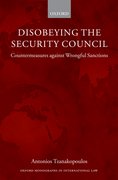This book examines how the United Nations Security Council, in exercising its power to impose binding non-forcible measures ('sanctions') under Article 41 of the UN Charter, may violate international law, in the sense of limits on its power imposed by the UN Charter itself and by general international law, including human rights guarantees.
Such acts may engage the international responsibility of the United Nations, the organization of which the Security Council is an organ. It then proceeds to assess how and by whom the engagement of this responsibility can be determined. Most importantly, the book discusses how and by whom the responsibility of the UN for unlawful Security Council sanctions can be implemented. In other words, how the UN can be held to account for Security Council excesses.
The central thesis of this work is that States can respond to unlawful sanctions imposed by the Security Council, in a decentralized manner, by disobeying the Security Council's command. In international law, this disobedience can be justified as constituting a countermeasure to the Security Council's unlawful act.
Recent practice of States, both in the form of executive acts and court decisions, demonstrates an increasing tendency to disobey sanctions that are perceived as unlawful. After discussing other possible qualifications of disobedience under international law, the book concludes that this practice can (and should) be qualified as a countermeasure.
1: Responsibility as a Form of Accountability
2: Attribution of Conduct to the UN
3: The Element of Breach
4: Judicial Determination
5: Determination by States
6: The Content of International Responsibility
7: Implementation through Self-Enforcement
8: General Conclusion
2: Attribution of Conduct to the UN
3: The Element of Breach
4: Judicial Determination
5: Determination by States
6: The Content of International Responsibility
7: Implementation through Self-Enforcement
8: General Conclusion

Antonios TZANAKOPOULOS, Disobeying the Security Council. Countermeasures against Wrongful Sanctions, Oxford, Oxford University Press, 2011 (288 pp.)
Antonios Tzanakopoulos is Lecturer in Public International Law at the University of Glasgow. Prior to that, he taught at the University of Oxford in Public International Law. He studied law in Athens, New York and Oxford. Antonios is a qualified lawyer with the Athens Bar in Greece, Associate Editor for the Oxford Reports on International Law in Domestic Courts, and collaborateur scientifique of the Hellenic Institute for International and Foreign Law.
Aucun commentaire :
Enregistrer un commentaire